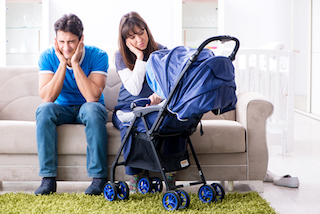 Postpartum mental illnesses such as postpartum depression can put a lot of strain on a relationship. A new study published in the journal, Frontiers in Psychology, examined the impact of postpartum post-traumatic stress and depression symptoms on a couple’s relationship satisfaction.
Postpartum mental illnesses such as postpartum depression can put a lot of strain on a relationship. A new study published in the journal, Frontiers in Psychology, examined the impact of postpartum post-traumatic stress and depression symptoms on a couple’s relationship satisfaction.
“We know that a couple’s relationship is of particular importance in the transition to parenthood and in the early childhood years because it is related to the well-being and mental health of partners, children, and the family,” study author, Dr. Antje Horsch told us. “One factor that may substantially influence relationship quality and couple satisfaction after childbirth is the woman’s experience of birth.”
Studies have shown that up to one third of women perceive their delivery as traumatic. In some cases, childbirth can involve a threat to the life of the mother and/or her baby or severe injury. As a consequence, women giving birth can develop post-traumatic stress disorder (PTSD), which is characterized by re-experiencing, avoidance, numbing, and hyperarousal symptoms as well as negative cognitions and mood. This is the case for one to six per cent of women following childbirth but for 16-19 per cent of women following high risk situations, such as preterm birth or emergency cesarean section.
“Our study’s main aim was to investigate this issue, and to examine mechanisms through which PTSD symptoms related to childbirth are related to couple satisfaction,” Dr. Horsch told us. “We assumed that postpartum PTSD would be related to low couple relationship satisfaction, and that this would particularly be the case for those who also suffered from postpartum depression symptoms.”
Dr. Horsch and fellow author Dr. Susan Garthus-Niegel decided to conduct the study because they felt that although postpartum depression has gained a lot of attention over the last decade, postpartum PTSD is less well known but its potential negative consequences warrant more in-depth research.
Over 2000 Norwegian women participated in the study. The women came from a previous study called the Akershus Birth Cohort. Researchers followed them from mid-pregnancy until two years postpartum. During this period, the women filled in several questionnaires regarding their mental and physical health. Eight weeks after childbirth, researchers assessed the women’s level of PTSD symptoms and depressiveness.
“Two years later we could see how those would affect the women’s couple relationship satisfaction,” Dr. Garthus-Niegel told us. “In addition, as many other factors may affect couple relationship satisfaction, we took into account many of those factors, too, e.g., the number of children women had, their employment situation, other challenging life events they might have gone through, or the temperament of their child she had given birth to two years ago. To do all this we applied advanced statistical modelling.”
Next to other factors that researchers already knew had an adverse effect on couple relationship satisfaction (for instance having more than one child, having a child that is particularly challenging, or having gone through additional stressful life events), the results of the study showed women who felt traumatized after giving birth were more likely to become depressed which in turn more often led to poor couple relationship satisfaction.
“Our results confirmed what we knew from other contexts. Traumatized war veterans also often suffer from poor couple relationship satisfaction,” Dr. Garthus-Niegel told us. “Our findings are also intuitive, because suffering from depression often goes along with negative thoughts about both oneself as well as other people. Such negative thoughts are likely to also affect the perception of the couple relationship. Some women may even feel they are no longer worthy of the relationship.”
Dr. Horsche and Dr. Garthus-Niegel believe that going forward, detecting couple relationship problems early on and providing appropriate professional help may improve parenting and promote positive child outcomes. Furthermore, early identification of women with symptoms of postpartum PTSD or depression and rapid access to evidence-based treatment where appropriate are vital.
“Apart from the distress experienced by the mother and the couple, PTSD following childbirth can have negative consequences for the whole family,” Dr. Garthus-Niegel told us. “Some studies found that it can also negatively interfere with the mother-infant relationship. This is turn may interfere with the development of these children. Yet another reason to promote the early detection of mental health symptoms in parents following the birth of their child.”
Patricia Tomasi is a mom, maternal mental health advocate, journalist, and speaker. She writes regularly for the Huffington Post Canada, focusing primarily on maternal mental health after suffering from severe postpartum anxiety twice. You can find her Huffington Post biography here. Patricia is also a Patient Expert Advisor for the North American-based, Maternal Mental Health Research Collective and is the founder of the online peer support group - Facebook Postpartum Depression & Anxiety Support Group - with over 1500 members worldwide. Blog: www.patriciatomasiblog.wordpress.com
Email: tomasi.patricia@gmail.com